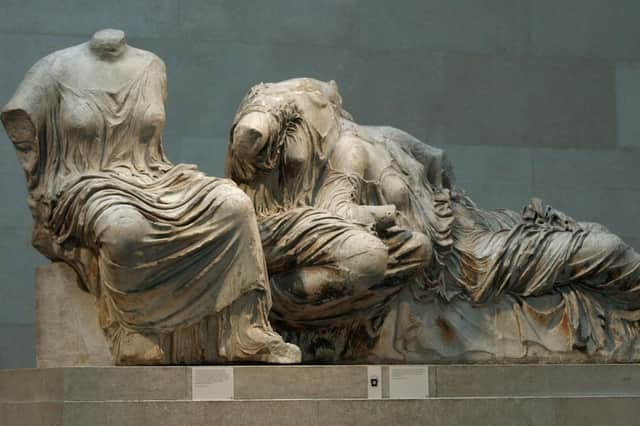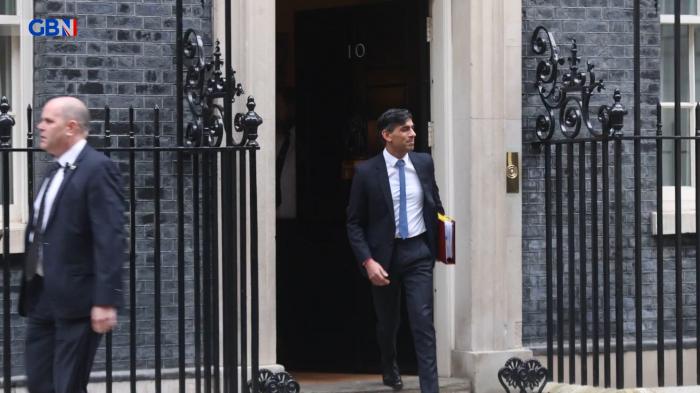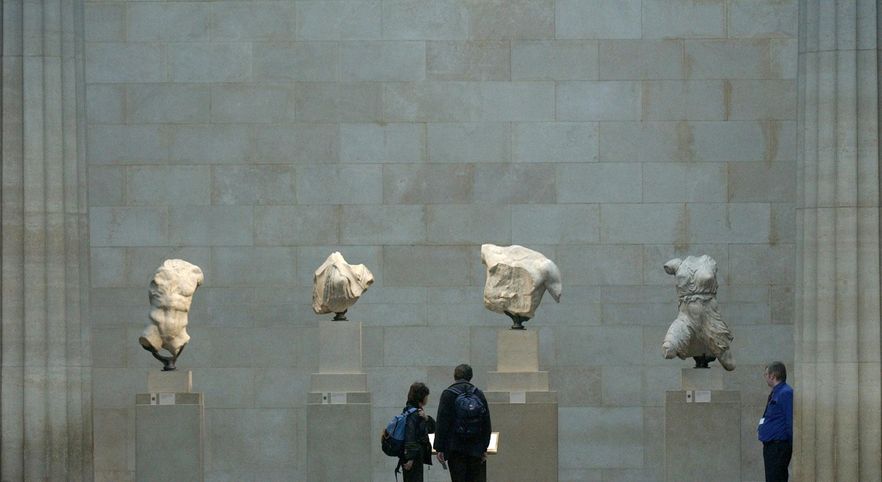AFP
November 27, 2023

Part of he Parthenon Marbles, also known as the Elgin Marbles, at the British Museum in London - Copyright AFP Bryan R. Smith
Greek Prime Minister Kyriakos Mitsotakis expressed his “displeasure” Monday over UK counterpart Rishi Sunak’s last minute cancellation of a bilateral meeting set to discuss their long-running dispute over the Parthenon Marbles.
The two leaders were due to hold talks midday Tuesday in London, where Mitsotakis has been visiting since Sunday, before news of their axing emerged late Monday amid an apparent spat over the so-called Elgin Marbles.
“I would like to express my displeasure at the British Prime Minister’s cancellation of our meeting just a few hours before it was due to take place,” the Greek leader said in a brief statement.
He reportedly declined a UK offer to meet Deputy Prime Minister Oliver Dowden instead.
A Downing Street spokesperson said “the UK-Greece relationship is hugely important”, citing joint work within NATO and “tackling shared challenges like illegal migration” and the wars in Ukraine and the Middle East.
“The deputy prime minister was available to meet with the Greek PM to discuss these important issues,” the spokesperson added, without referencing the marbles issue.
The sculptures were taken from the Parthenon temple at the Acropolis in Greece in the early 19th century by British diplomat Thomas Bruce, the earl of Elgin.
Athens maintains the marbles were stolen, which Britain denies, and the issue has been a source of contention between the countries for decades.
Sunak has “no plans” to facilitate their return to Athens, his spokesman said earlier Monday.
“Greece’s position on the issue of the Parthenon friezes is well known. I had hoped to have the opportunity to discuss them with my British counterpart,” Mitsotakis lamented.
“Those who believe in the rightness and validity of their positions are never afraid to confront the arguments,” he added.
According to the Greek news agency ANA, citing sources within the Greek government, the British prime minister was apparently upset by comments made by his Greek counterpart to the BBC on Sunday.
In his comments Sunday, Mitsotakis likened the collection being held at the British Museum to the Mona Lisa painting being cut in half.
Athens had been lobbying London for a deal that would return the sculptures under some kind of loan arrangement, he told the BBC.
A source from Britain’s ruling Conservatives told the broadcaster Monday that “it became impossible for this meeting to go ahead following commentary regarding the Elgin Marbles prior to it”.
burs-jj/pvh
Good Tuesday morning. This is Rosa Prince.
RISHI LOSES HIS MARBLES: Prime Minister Rishi Sunak is at the center of a diplomatic storm this morning after canceling a planned meeting with Greek counterpart Kyriakos Mitsotakis in a spat over some cold, dead artworks. Playbook got a sniff of the brewing row when No. 10 reached out to say the planned prime ministerial tête-à-tête would instead feature Deputy PM Oliver Dowden, which seemed … odd, given Mitsotakis had said on telly he was due to meet Sunak. An hour or so later, the Greek PM announced he was cutting short his trip and heading home.
You say Parthenon Sculptures, I say Elgin Marbles: The row was triggered after Mitsotakis appeared on the BBC’s Sunday with Laura Kuenssberg show, where he was outspoken about his distress at many of the sculptures still present in the British Museum. “It’s as if I told you that you would cut the Mona Lisa in half and you would have half of it at the Louvre and half of it at the British Museum,” he lamented, adding “this is exactly what happened with the Parthenon Sculptures.”
All Greek to me: Sunak is said to have been “irritated” by Mitsotakis’ words, so much so that he took the extraordinary step of calling off their talks, due at 12.45 p.m. today, while the Greek leader was halfway through a three-day trip to London. The Beeb’s Chris Mason quoted a “senior Conservative source” saying: “It became impossible for this meeting to go ahead following commentary regarding the Elgin Marbles prior to it.”
Undiplomatic: Rather than accept the switcheroo, Mitsotakis declined to meet Dowden and delivered a stinging rebuke: “I express my annoyance that the British prime minister cancelled our planned meeting just hours before it was due to take place. Anyone who believes in the rightness and justice of his positions is never afraid of confronting arguments.” My colleague Nektaria Stamouli has a write-up.
**A message from Mastercard: Small businesses deserve access to resources which match their ambition. Mastercard’s Strive UK programme has helped over a million businesses access the tools, support, and insights they need to thrive. Find out more about how Strive UK is enabling British entrepreneurs to succeed in today’s digital economy.**
(Ancient) culture wars: The Greek PM was uninvited to tea with Rishi round about the time he was meeting Keir Starmer Monday evening — with the Tories eager to suggest the Labour leader was soft on the marbles. An insider close to the talks told Playbook the issue was “discussed, but wasn’t the focal point of the meeting.” They added that Labour sees the matter as one for the British Museum and the Greeks, not the U.K. government.
Ouch: A Labour spokesperson said of Sunak’s decision not to meet Mitsotakis: “If the prime minister isn’t able to meet with a European ally with whom Britain has important economic ties, this is further proof he isn’t able to provide the serious economic leadership our country requires.”
But but but: A senior Conservative highlighted recent reports, briefed out over the weekend, that Starmer is “open” to the return of the marbles if an arrangement can be agreed between the museum and the Greeks. They added: “Starmer sold out to secure a meeting. It’s naive on his part and shows how little regard he has for British taxpayers who have looked after these for generations. Starmer is up to his old tricks of just telling the person in front of him what they want to hear.”
Hitting back: Labour said by pulling out of the meeting Sunak had missed an opportunity to discuss illegal immigration with a key European ally. The insider added: “Keir and the Greek PM discussed immigration in their meeting so you’ve got the leader of the opposition as the U.K. voice on all these important issues.”
Hot takes: Political X was divided, with some saying the government had massively messed up with the mega snub to the Greeks, and others arguing Labour had walked into a trap by appearing shaky over the marbles. A third and vocal group asked whether all of the above is the grandaddy of dead cats designed to distract from stuff the government really doesn’t want to talk about: we’re looking at you, James Cleverly.
Playbook won’t be falling for that one: The full story of the home secretary’s travails follow.
But first more on the marbles: The Parthenon Project, which is working with both sides to try to find a joint solution that sees the sculpture reunified in Athens, said it was disappointed by the sudden collapse in talks. A spokesperson said: “It’s a shame the British prime minister feels he can’t discuss the subject of the Elgin Marbles with the Greek prime minister, especially given how much both countries stand to gain from a sensible resolution on this matter and the level public support for reunification.”
Look away now, Rishi Sunak: The Times leader column calls for the sculptures to be reunited and displayed “in their natural habitat.”
Want to know more about Mitsotakis? My POLITICO Colleague Anne McElvoy interviewed him for her Power Play podcast last month.
And now read this: Another top colleague, Graham Lanktree, wrote this fabulous POLITICO feature back in May on the knotty geo-diplomacy of countries returning (or not returning) stolen artefacts to their rightful place — focused on the famously cursed Koh-i-Noor diamond which is part of the Crown Jewels.













